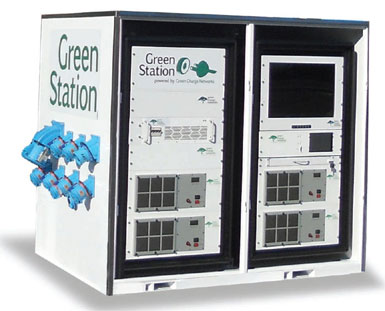Green Charge Networks is getting a $56 million capital infusion to accelerate its leasing model for commercial and industrial energy storage.
K Road Power, a utility-scale solar developer and owner, is making the investment as a way to get into the smart grid business.
Since its founding in 2009, Green Charge’s "Green Station" has been installed by 7-Eleven, Walgreens, Levi’s Stadium, UPS, school campuses, and cities in California and New York.
The company’s goal is to spur the energy storage market as solar leasing has done for that market. Green Charge owns, installs and maintains energy storage systems (lithium batteries) for customers – with no upfront cost – under a long-term Power Efficiency Agreement. It’s a hybrid of the solar leasing model and ESCO model because Green Charge gets paid by sharing in the savings the systems produce.
K Road’s investment makes it possible for Green Charge to install the systems at no cost to the customer, in the same way that solar leasing funds do for SolarCity and its competitors.
What sets Green Charge apart is its real-time software and controller which monitors how much electricity a facility uses on a second-by-second basis. It takes historical data into account as well, allowing for predictive energy storage charge/ discharge decisions that exactly offset peaks and valleys of energy consumption. This ensures a facility always pays much cheaper off-peak utility rates.

Green Charge calls this the next wave of energy efficiency innovation, since most low-hanging fruit from efficient lighting, HVAC etc. have been mostly captured.
"The next wave of innovation will come from Power Efficiency solutions … a $100 billion+ market … "By leveling peak power demands through energy storage on the customer’s side of the meter and increasing power efficiency, everyone wins – commercial businesses (reduced demand charges; no behavioral modifications required), utilities (less capital expenditures for service upgrades & power plants), renewable energy adoption (energy storage buffering intermittent PV or wind generation), and the public (use of fewer dirty peaker plants).
AES Corp (NYSE: AES) says its energy storage division is selling batteries that are powerful enough to replace peak power plants.
Energy storage is considered an important emerging industry, with start-ups raising over $100 million this year so far, not including this round for Green Charge. It’s high on the list for venture capital investments.
California, New York, Massachusetts Lead
California now requires that 1.3 gigawatts of energy storage be integrated into the grid by 2020.
New York and Massachusetts are embarking on "energy modernization initiatives," forcing utilities to fundamentally change how electricity is distributed and used.
The idea is to make the electric system much more energy efficient and reliable, empower customer choice, encourage deeper penetration of renewable energy and wider deployment of microgrids, on-site power and energy storage. Dealing with the inefficiency of peak demand is high on the list, which Green Charge specializes in.
Entrepreneurs working on batteries and other energy storage technologies now have a state-of-the art facility to develop their products – New York Battery and Energy Storage Technology Consortium (NY-Best).
In June, Massachusetts announced that state utilities must develop and implement a 10-year grid modernization plan, with regular updates.
Here is their website:
